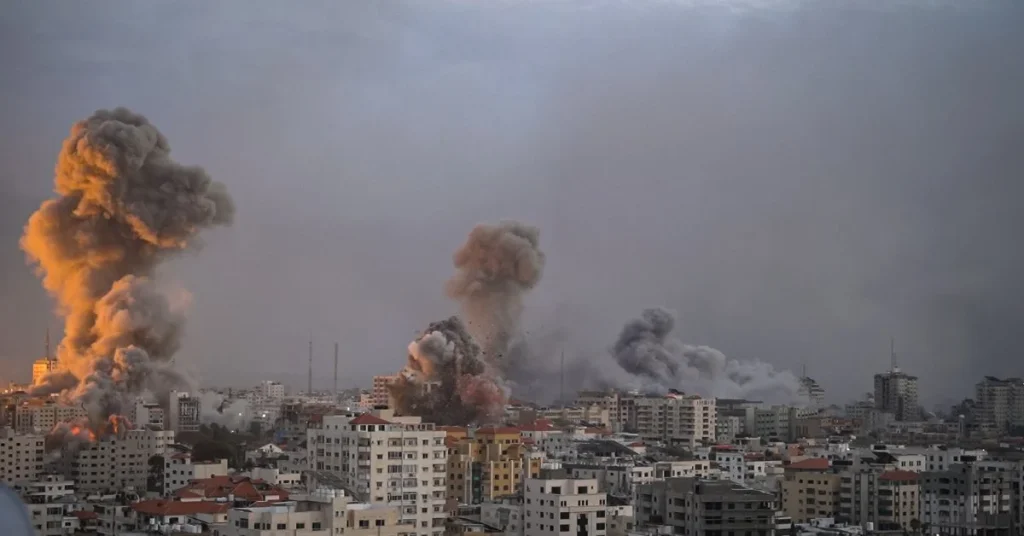Egypt hosts Hamas talks amid Gaza airstrikes

A senior delegation from the leadership of Hamas, headed by Khalil al-Hayya, arrived in Cairo on October 19th to engage with Egyptian, Qatari, Turkish, and U.S. mediators, as well as Palestinian forces.
The meeting was scheduled in order to follow up on the implementation of the ceasefire agreement signed earlier this month in Sharm el-Sheikh. The visit comes as Israel launched a new wave of airstrikes across the Gaza Strip, accusing Hamas of breaching the truce, as reported by The New Arab plus agencies on October 19th.
In a statement, Hamas announced that “a delegation from the leadership … has arrived in the Egyptian capital, Cairo, to follow up on the implementation of the ceasefire agreement with mediators, factions, and Palestinian forces.” The group reaffirmed that it “remains committed to the ceasefire and is implementing its terms with full precision and responsibility,” while simultaneously accusing Israel of ongoing infractions, saying “Israel continues to commit violations of the agreement.”

The ceasefire, brokered on October 9th under the framework of U.S. President Donald Trump’s plan to stop the Gaza conflict, officially took effect on October 10th. But as both sides trade accusations, the deal’s fragility has become increasingly apparent. According to the Gaza Media Office, Israeli forces have carried out 80 breaches since October 10th, killing 97 people and causing another 230 to suffer wounds. The statement described these actions as “flagrant and clear violations of the ceasefire decision and the rules of international humanitarian law,” noting that breaches were recorded in all governorates of Gaza.
Hamas has also accused Israel of failing to adhere to key obligations — including the delivery of humanitarian aid, withdrawal, and the liberation of female and child detainees. The group urged the mediators — Egypt, Qatar, Turkey, and the US — “to intervene urgently to ensure the implementation of the agreement and to protect civilians.” This warning echoes concerns surrounding humanitarian access in Gaza, where the humanitarian chief of the UN, Tom Fletcher, called for greater aid entry points and stronger monitoring mechanisms.
Meanwhile, Israel’s military confirmed it had conducted a series of air raids on Gaza in response to alleged violations by Hamas. The army alleged that Hamas had fired “anti-tank shells and gunfire at engineering vehicles working to destroy terrorist infrastructure in the Rafah area in accordance with the terms of the agreement.” The Israeli army said it “struck dozens of targets in the Gaza Strip” in a retaliatory response. Reportedly, at least 45 people have been killed and several others injured, while Hamas’s armed wing denied conducting any attacks.
This is not the first time Israel has been accused of breaching the truce since its announcement, with earlier incidents already drawing international criticism. Israel’s public broadcaster Kan reported that the Israeli government decided on October 19th to shut all Gaza crossings and stop the entry of aid “until further notice,” reportedly, following military recommendations.
However, on the night of October 19th, the Israeli military said it had resumed enforcing the ceasefire in Gaza after completing its strikes. “In accordance with the directive of the political echelon, and following a series of significant strikes in response to Hamas’ violations, the IDF [Israel Defense Forces] has begun the renewed enforcement of the ceasefire,” the statement read. “The IDF will continue to uphold the ceasefire agreement and will respond firmly to any violation of it.”
The Egyptian government continues to play a pivotal role in facilitating communication between the two sides. Cairo has assumed a central position in overseeing the Gaza peace framework, leveraging its longstanding ties with both Israel and Palestinian factions. Observers note that Egypt’s leadership, which has at times been open to broader international involvement — including the possible deployment of peacekeeping forces as previously reported — underscores its commitment to preventing a total collapse of the truce.
Regional reactions have also been strong. Hezbollah, for example, praised the ceasefire as proof of the power of armed resistance. This highlights how developments in Gaza continue to reverberate across the Middle East, influencing broader regional alliances and security calculations.
As the Hamas delegation resumes talks in Cairo, mediators are expected to push both sides towards reaffirming their commitment to the Sharm el-Sheikh accord. Yet, with mutual distrust deepening and humanitarian conditions worsening, questions remain over whether this truce can evolve into lasting peace — or whether it will become yet another short-lived pause in a cycle of recurring violence.
The New Arab plus Agencies, Kan, Maghrebi.org
Want to chase the pulse of North Africa?
Subscribe to receive our FREE weekly PDF magazine














